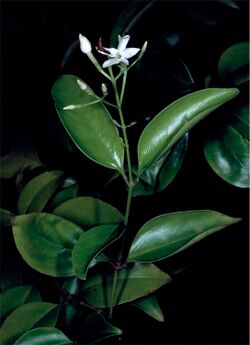Biology:Acronychia pauciflora
| Few-flowered acronychia | |
|---|---|

| |
| Acronychia pauciflora in the Australian National Botanic Gardens | |
| Scientific classification | |
| Kingdom: | Plantae |
| Clade: | Tracheophytes |
| Clade: | Angiosperms |
| Clade: | Eudicots |
| Clade: | Rosids |
| Order: | Sapindales |
| Family: | Rutaceae |
| Genus: | Acronychia |
| Species: | A. pauciflora
|
| Binomial name | |
| Acronychia pauciflora C.T.White[1]
| |
Acronychia pauciflora, commonly known as few-flowered acronychia or soft acronychia,[2] is a species of shrub or small tree that is endemic to eastern Australia. It has simple, egg-shaped leaves with the narrower end towards the base, greenish white flowers arranged in small groups, mostly in leaf axils and fleshy, more or less spherical fruit.
Description
Acronychia pauciflora is a shrub or tree that typically grows to a height of 10 m (33 ft) and has wrinkled or finely scaly, creamy-fawn bark. The leaves are simple, 20–95 mm (0.79–3.74 in) long and 10–48 mm (0.39–1.89 in) wide on a petiole usually 4–14 mm (0.16–0.55 in) long. The flowers are arranged in small groups 8–12 mm (0.31–0.47 in) long, mainly in leaf axils, each flower on a pedicel 0.5–2 mm (0.020–0.079 in) long. The four sepals are about 1 mm (0.039 in) wide, the four greenish white petals 4–6 mm (0.16–0.24 in) long, and the eight stamens alternate in length. Flowering occurs from December to July and the fruit is a fleshy drupe 7–9 mm (0.28–0.35 in) long and more or less spherical.[2][3][4][5]
Taxonomy
Acronychia pauciflora was first formally described in 1946 by Cyril Tenison White in the Proceedings of the Royal Society of Queensland.[6][7]
Distribution and habitat
This acronychia grows between Broad Sound in central eastern Queensland, the Richmond River in north-eastern New South Wales and as far inland as the Carnarvon Range. It grows in rainforest and in brigalow (Acacia harpophylla) scrub from sea level to an altitude of 650 m (2,130 ft).[2][3]
Conservation status
This species is classified as of "least concern" under the Queensland Government Nature Conservation Act 1992.[8]
References
- ↑ "Acronychia pauciflora". Australian Plant Census. https://biodiversity.org.au/nsl/services/apc-format/display/74003. Retrieved 4 July 2020.
- ↑ 2.0 2.1 2.2 Hartley, Thomas G. (2013). Wilson, Annette J.G.. ed. Flora of Australia (Volume 26). Canberra: Australian Biological Resources Study. p. 110. https://profiles.ala.org.au/opus/foa/profile/Acronychia%20pauciflora. Retrieved 4 July 2020.
- ↑ 3.0 3.1 "Acronychia pauciflora". Centre for Australian National Biodiversity Research (CANBR), Australian Government. 2020. https://apps.lucidcentral.org/rainforest/text/entities/Acronychia_pauciflora.htm.
- ↑ Hartley, Thomas G. (1974). "A revision of the genus Acronychia (Rutaceae).". Journal of the Arnold Arboretum 55 (3): 493–495. doi:10.5962/p.324717. https://www.biodiversitylibrary.org/item/90519#page/505/mode/1up. Retrieved 4 July 2020.
- ↑ Richards, P.G.; Harden, Gwen J.. "Acronychia pauciflora". Royal Botanic Garden Sydney. http://plantnet.rbgsyd.nsw.gov.au/cgi-bin/NSWfl.pl?page=nswfl&lvl=sp&name=Acronychia~pauciflora. Retrieved 4 July 2020.
- ↑ "Acronychia pauciflora". APNI. https://id.biodiversity.org.au/instance/apni/486375. Retrieved 4 July 2020.
- ↑ White, Cyril Tenison (1946). "Contributions to the Queensland Flora, No. 9.". Proceedings of the Royal Society of Queensland 57: 21–22. https://www.biodiversitylibrary.org/item/195752#page/31/mode/1up. Retrieved 4 July 2020.
- ↑ "Species profile — Acronychia pauciflora (soft acronychia)". Queensland Government Department of Environment and Science. https://apps.des.qld.gov.au/species-search/details/?id=15872. Retrieved 4 July 2020.
Wikidata ☰ Q5656842 entry
 |

